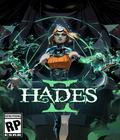Hades II opens up an unknown period of time after the events of the first game. Since then, Hades and Persephone had a second child, Melinoe. Immediately afterward, Chronos the Titan, ruler of time, launched an attack on the House of Hades. Hades, Persephone, and Zagreus are all missing, and the gods have been forced into a war against the seemingly unstoppable Titan. Only Melinoe, trained by the witch Hecate, can defeat the Titan. To do so, she must venture to the depths of the underworld, a mission that not even death can stop....
Melinoe's basic gameplay has a lot in common with her dear brother. Like Zagreus, she can dart around the arena with a near-constant barrage of attacks and dodges. In fact, most of the basic skills you learned in Hades will transfer over. What is new for Melinoe is how her basic combat works. As in the previous game, you have attack, special, and cast buttons. Attack seems to be a close-range attack, special is a ranged attack, and cast is a binding area-of-effect attack. The specifics change based on the weapon that's equipped. The Witch's Staff functions like a spear with a long-distance basic attack. The Sister Blades are close-range daggers that focus on attack speed and mobility.
The real twist comes from the new Omega attacks. Unlike the first game, you have an MP bar, but it replenishes in every room and can be upgraded to regenerate naturally. By holding down the attack, special, or cast buttons, you'll use the omega variation of attacks. The Witch's Staff attack creates a two-pronged area-of-effect attack, while its special is a supercharge explosive blast. The Blades provide an instant teleport behind the enemy and the ability to throw multiple small knives. The omega variation of cast appears to be consistent, causing the binding effect to deal damage when it ends.
Those new abilities mix with the returning godly boons from the first game. As in the original, you'll encounter gods and goddesses who want to enchant Melinoe's abilities with their gifts. These include returning gods, such as Zeus and Poseidon, as well as newcomers, including Apollo, Hephaestus, Hestia and more. Some returning gods have even changed up things. Artemis is no longer a distant presence but will appear in battle to assist you before she offers a boon.
Boons aren't just copy and pasted from the first game. Every god has new effects. Zeus now inflicts the Blitz status effect, which causes enemies to take a big lightning bolt of extra damage after you deal a certain amount of damage. Aphrodite's skill now focuses on providing damage bonuses when you're close to enemies. The new gods have their own tricks. Hestia offers fire damage and the ability to nullify projectiles, while Hephaestus makes your attack do an explosive attack that takes time to recharge. These abilities also impact your omega skills, adding an element of the god's power to the charged-up version.
The ultimate powers that the gods gifted, their Calls, seem to have been replaced by a new mechanic called Hexes. Granted by Selene, the Goddess of the Moon, Hexes are powerful attacks that can do things like heal you, turn enemies into livestock, or let you perform a huge area-of-effect attack. To use a Hex, you have to charge it up by using MP. The stronger the Hex, the more MP you need to use, and Hex status isn't saved between rooms. This means it's best to spend MP as liberally as possible rather than sitting on it.
There are plenty of other ways to power up in the field. As in the first game, you'll go from room to room and collect prizes. These include the return of useful trinkets such as the Daedalus Hammers that add attributes to weapons, Poms to improve boons, Nectar to trade with characters to raise friendship levels and earn heirlooms, and more. It seems like almost every mechanic from the first game is returning in some form.
There are new things as well. Arachne the weaver-slash-spider can be encountered while adventuring. She'll offer Melinoe new outfits that grant her passive boons, ranging from faster MP regeneration to free gold after every room. These outfits even give Melinoe a chunk of bonus HP. However, this HP can't be replenished and when the outfit is destroyed, returning Melinoe to her usual gear and losing the bonus.
It wouldn't be Hades if death weren't around every corner, and it seems perfectly true in Hades II. The overall difficulty seems tuned a touch higher, with more enemies and higher damage output, but Melinoe is also a fair bit stronger. However, like the original, dying in Hades II isn't a bad thing. You'll return to your hub at The Crossroads, where you'll get the chance to upgrade abilities, create special concoctions that unlock new features, and hang out with a variety of goofy characters that range from the gloomy ghost Dora to the incredibly aggressive Nemesis.
Really, Hades II is more of Hades. It's a sequel to the first game that aims to bring back the same enjoyable gameplay and sense of progression but with more stuff: more gods, more enemies, more weapons, more everything. What we played of Hades II during the technical test made it clear that Supergiant hasn't lost its touch, and I'm hankering for more when Hades II enters Early Access on PC later this year.
More articles about Hades II












 Hades II is a rogue-like dungeon crawler in which you'll battle beyond the Underworld of Greek myth using dark sorcery to take on the sinister Titan of Time.
Hades II is a rogue-like dungeon crawler in which you'll battle beyond the Underworld of Greek myth using dark sorcery to take on the sinister Titan of Time.




